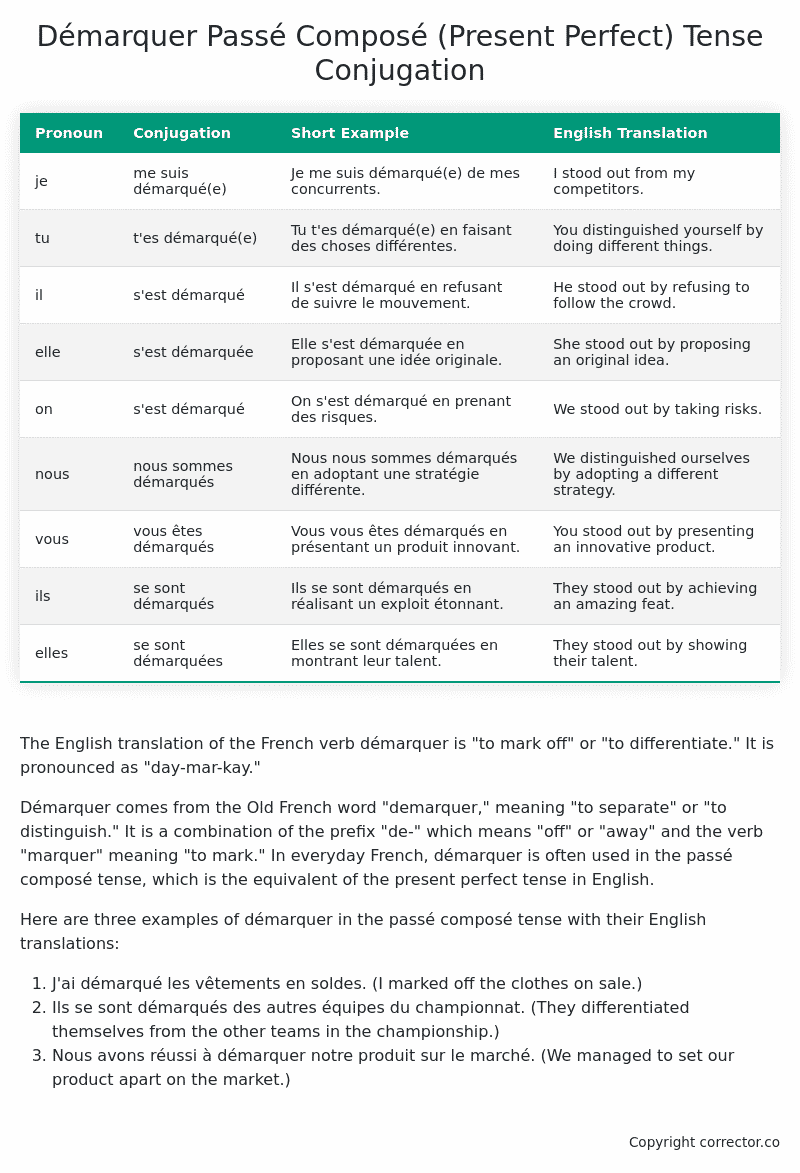Passé Composé (Present Perfect) Tense Conjugation of the French Verb démarquer
Introduction to the verb démarquer
The English translation of the French verb démarquer is “to mark off” or “to differentiate.” It is pronounced as “day-mar-kay.”
Démarquer comes from the Old French word “demarquer,” meaning “to separate” or “to distinguish.” It is a combination of the prefix “de-” which means “off” or “away” and the verb “marquer” meaning “to mark.” In everyday French, démarquer is often used in the passé composé tense, which is the equivalent of the present perfect tense in English.
Here are three examples of démarquer in the passé composé tense with their English translations:
- J’ai démarqué les vêtements en soldes. (I marked off the clothes on sale.)
- Ils se sont démarqués des autres équipes du championnat. (They differentiated themselves from the other teams in the championship.)
- Nous avons réussi à démarquer notre produit sur le marché. (We managed to set our product apart on the market.)
Table of the Passé Composé (Present Perfect) Tense Conjugation of démarquer
| Pronoun | Conjugation | Short Example | English Translation |
|---|---|---|---|
| je | me suis démarqué(e) | Je me suis démarqué(e) de mes concurrents. | I stood out from my competitors. |
| tu | t’es démarqué(e) | Tu t’es démarqué(e) en faisant des choses différentes. | You distinguished yourself by doing different things. |
| il | s’est démarqué | Il s’est démarqué en refusant de suivre le mouvement. | He stood out by refusing to follow the crowd. |
| elle | s’est démarquée | Elle s’est démarquée en proposant une idée originale. | She stood out by proposing an original idea. |
| on | s’est démarqué | On s’est démarqué en prenant des risques. | We stood out by taking risks. |
| nous | nous sommes démarqués | Nous nous sommes démarqués en adoptant une stratégie différente. | We distinguished ourselves by adopting a different strategy. |
| vous | vous êtes démarqués | Vous vous êtes démarqués en présentant un produit innovant. | You stood out by presenting an innovative product. |
| ils | se sont démarqués | Ils se sont démarqués en réalisant un exploit étonnant. | They stood out by achieving an amazing feat. |
| elles | se sont démarquées | Elles se sont démarquées en montrant leur talent. | They stood out by showing their talent. |
Other Conjugations for Démarquer.
Le Present (Present Tense) Conjugation of the French Verb démarquer
Imparfait (Imperfect) Tense Conjugation of the French Verb démarquer
Passé Simple (Simple Past) Tense Conjugation of the French Verb démarquer
Passé Composé (Present Perfect) Tense Conjugation of the French Verb démarquer (this article)
Futur Simple (Simple Future) Tense Conjugation of the French Verb démarquer
Futur Proche (Near Future) Tense Conjugation of the French Verb démarquer
Plus-que-parfait (Pluperfect) Tense Conjugation of the French Verb démarquer
Passé Antérieur (Past Anterior) Tense Conjugation of the French Verb démarquer
Futur Antérieur (Future Anterior) Tense Conjugation of the French Verb démarquer
Subjonctif Présent (Subjunctive Present) Tense Conjugation of the French Verb démarquer
Subjonctif Passé (Subjunctive Past) Tense Conjugation of the French Verb démarquer
Subjonctif Imparfait (Subjunctive Imperfect) Tense Conjugation of the French Verb démarquer
Subjonctif Plus-que-parfait (Subjunctive Pluperfect) Tense Conjugation of the French Verb démarquer
Conditionnel Présent (Conditional Present) Tense Conjugation of the French Verb démarquer
Conditionnel Passé (Conditional Past) Tense Conjugation of the French Verb démarquer
L’impératif Présent (Imperative Present) Tense Conjugation of the French Verb démarquer
L’infinitif Présent (Infinitive Present) Tense Conjugation of the French Verb démarquer
Struggling with French verbs or the language in general? Why not use our free French Grammar Checker – no registration required!
Get a FREE Download Study Sheet of this Conjugation 🔥
Simply right click the image below, click “save image” and get your free reference for the démarquer present perfect tense conjugation!

Démarquer – About the French Passé Composé (Present Perfect) Tense
Formation of the Passé Composé
Set the auxiliary verb with either
Conjugate the auxiliary verb
Add the past participle
Common everyday usage patterns
Narrating Past Events
Sequential Actions
Describing Completed Actions
Interactions with other tenses
Imperfect Tense
Conditional and Future Tenses
Summary
I hope you enjoyed this article on the verb démarquer. Still in a learning mood? Check out another TOTALLY random French verb conjugation!


